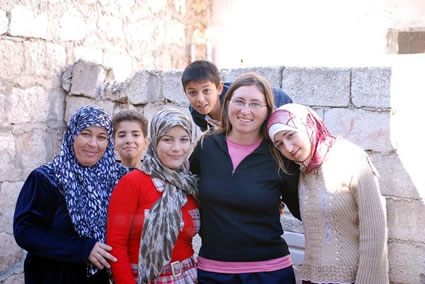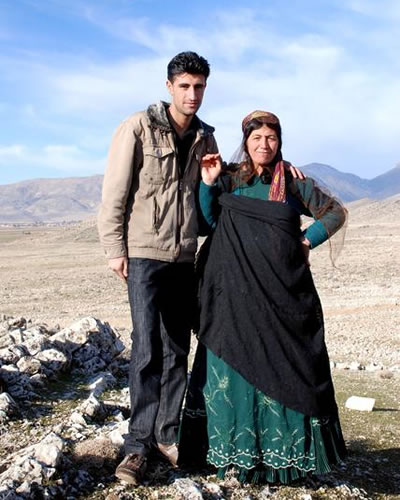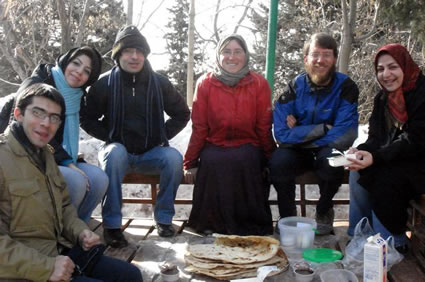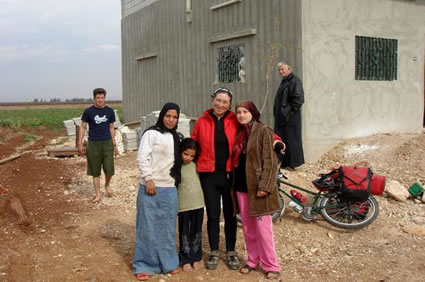How to Enjoy Hospitality in the Middle East
A Guide to Accepting and Adapting to the Traditions
Story and photos by Friedel Rother

|
|
Meeting the neighbors during one visit to the small village of Taftanaz in Syria.
|
It was a full year into our world bicycle tour before our respective families dropped the first hint of unease. Our 2-wheeled adventures across Europe barely raised an eyebrow but emails started flying when we announced joyfully that we had obtained an Iranian visa and would also pedal through Turkey and Syria.
“I don't approve of your destination. Can't you fly to Australia?” one relative wrote. “I hope no videos of you appear on the internet,” said another. “Watch out, you'll be shot. Better come to Florida. It's safer,” was one response to our request for advice online.
It is hard to be positive about the Middle East while watching the nightly news. We crossed the border between Greece and Turkey nervously, visions of militants and bombs in our minds. Those fears dissolved as the first shopkeeper we met insisted on putting a thick wedge of homemade cheese and grapes from his garden into our bags. It was the first clue that our primary danger was not death at gunpoint but rather death by overfeeding.
During our 6-month journey across the region we were taken hostage regularly by a families who rolled out multi-course meals, chocolates and fruits, and endless glasses of tea. This continued until we could bear no more and discreetly slipped to the bathroom to loosen our pants — a fine torture indeed and one which we endured with pleasure dozens of times over.
When not being stuffed to the gills, we would lean forward to pay the fare on a city bus and find someone had already bought our tickets. Locals eagerly guided us through twisting lanes to a hotel. Once a whole troupe of Iranians insisted on calling Central Asian embassies for us in an effort to sort out our complex onward visas; they didn't manage to cut through all the bureaucracy but they did warm our hearts.
Just Say Yes

|
|
A photo of a young Iranian man Siamak and his mother, who arrived at our tent with freshly homemade bread, yogurt and sugar one morning in southern Iran.
|
If there is one thing you can count on in the Middle East, it is that you do not need to seek out hospitality. It will find you. Standing on a street corner in Iran, looking confused or lost, is impossible to do for more than a minute before a helper will arrive and declare themselves to be at your service. In Syria, we ruled out accepting tea more than twice a day. Otherwise we would never have made it beyond the border post. Invitations flow freely from the smallest village to the biggest city.
The key to enjoying this warm welcome is simply to be brave enough to accept the offers that will come your way. Most of us were taught to beware of strangers, and suspicions are quickly raised when someone appears out of nowhere with an offer that seems too good to be true.
“Is this for real?” you will wonder as the man you asked for directions jumps in a cab with you and insists on paying the fare to the train station. It is so far removed from reality in many countries that it's almost unbelievable you will not be the victim of some scam. We cannot promise it will not happen, but in the hundreds of instances that we have accepted the help of others, we have never been disappointed.
“Why are you doing this?” we asked Talal as he arrived at our Damascus hotel to take us on a city tour and out for dinner. “It is my duty. You are a guest in my country,” was the reply. It was a commonly repeated response when we put the same query to others. “Travelers are a gift from God,” answered one young man.
Turn down these offers and you will miss an insight into the culture that no tour group or guidebook can give you. You might also miss out on making scores of new friends. Use your good sense and instincts, of course. Women traveling alone would not want to enter the home of a man they have only just met, but rest assured that the vast majority of kindness offered is genuine.
Culture Shock

|
|
An early morning breakfast picnic with Iranian friends at a mountain top park in Tehran in winter. Cold but very fun!
|
Even once convinced of someone's good intentions, being on the receiving end of Middle Eastern hospitality can be not only delightful but stressful for the uninitiated. This particularly applies when you are asked into a family home, introduced to every brother, sister, cousin and neighbor and peppered with questions while being stuffed with food and drink.
People will be intensely curious and before you have even sat down you are likely to be asked the first of many questions about your life. It is often what would be considered very personal probing for a Westerner but completely normal and not rude at all in the Middle East. “Do you have kids?” is a favorite, followed by “Why not?” if you do not.
“But, do you know how?” one family asked incredulously and entirely seriously as we tried to explain that we did not want any children just yet. If this line of questioning makes you uncomfortable, just answer “Inshallah” — an Arabic word that translates to “if God wills it.” That satisfies everyone and gives you a chance to suggest a new topic.
Your age, job, salary, religion and politics will also be of interest. Questions about the last two are almost always more out of curiosity and not an attempt to start a serious debate. A simple answer will suffice. Much of this conversation may be done with hand gestures so keep a pen and paper handy and practice your charades before you leave home! If you are lucky, the local English teacher will be invited over to serve as translator.
Moderation is the key when the food starts arriving. Your plate will be refilled several times, no matter how much you protest, so go easy from the start. And do not believe your mother's advice on cleaning your plate. To do so is a sure sign that you are still hungry and want more. If you cannot eat another bite, leave a few spoonfuls to the side and thank the cook profusely before sitting back. With a little luck, you will have a few moments to digest before the next cup of tea.
While visiting a family, remove your shoes at the door, dress modestly and never complement anything in the house that is not bolted down. Hospitality extends to giving guests anything they vaguely desire, so if you praise a picture on the wall you are likely to find it being wedged into your suitcase. We once let slip in Iran that we enjoyed eating a type of chocolate spread. The next morning we woke up to three large jars on the table: One for breakfast and two for our bags.
Giving Back
After being on the receiving end of so much kindness, you will want to restore the balance. A few small things will bring great joy. Here are some ideas:
-
Family photos: A great icebreaker. Fill a small album with photos from home. Use the internet to look up words in the local language describing the photos and write them down.
-
Pins, buttons or flags: Ask your town hall what they have to give away. Do not distribute these to kids casually on the street — this encourages begging — but a token gift for those who have been kind to you is always appreciated.
-
Balloons: A surefire winner with the neighborhood kids and easy to carry in your pocket.
-
Introduction letter: Write this in English, explaining about yourself and your trip. Get the first English speaker you meet in your destination to translate it. It will be read with great interest and helps avoid some of the charades.
-
Hostess gift: As with anywhere in the world, it is polite to arrive with something for the cook. Fresh fruit or sweets are always appropriate and can be found anywhere. Do not be surprised if the gift is casually placed to one side, without much of a fuss. This is a way of saying that you are more important than the gift. Your gesture has not gone unnoticed.
-
Personal talents: Can you juggle? Sing? Fold a paper airplane? Any little trick is likely to be new to your hosts and will certainly gather applause. Learn one before you leave home.
Pitfalls

|
|
Saying goodbye to a family in Syria who invited us in for tea and breakfast. They were quite poor and this was one situation where we were reluctant to eat. We could see they did not have much.
|
Despite all the wonderful possibilities being offered up, the intelligent traveler should be aware of a few potential pitfalls.
Hospitality is not a fast moving affair, so do not fool yourself into thinking you can drink a quick cup of tea and be on the move again a few minutes later. Set aside a good half hour for at least one refill of the glass and an entire afternoon for a family meal. If you are short on time, make that is to the hosts clear and try to reschedule.
Don not be afraid to say no politely if you really do not wish to accept someone's offer. Sometimes you just want to be on your own and are not up for the mental effort that socializing can require. It is better to decline with a “thank you” and a smile than leave your new friends wondering why you are not as chatty as they hoped.
Occasionally you may be asked into the home of a family that doesn't have much to share. Poverty is common in the Middle East but people still give what they can. You want to be a good guest without putting undue strain on the family so accept only a cup of tea if possible. If food is offered, take a little of the simplest thing so no one is hurt. Tell them you are vegetarian to avoid eating expensive meat.
Finally, just relax and enjoy the moment. When will you ever get the chance again to have a breakfast picnic with young Tehranians, eat dinner with a former member of the Shah's secret police, jump on a tractor with a farmer for a guided tour of the beach or get into someone's kitchen and cook along with them? These are all among our most cherished memories, each one just a typical day in the Middle East.
Friedel Rother gave up her job as a journalist for Reuters to ride a bicycle around the world with her husband.
|
